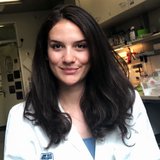
Johannes Griss, M.D. Ph.D.
Principal InvestigatorEmail: johannes.griss@meduniwien.ac.at
ORCID: 0000-0003-2206-9511
PubMed: https://pubmed.ncbi.nlm.nih.gov/?term=griss-j+%5Bauthor%5D
GitHub: https://github.com/jgriss/
Biographic sketch
Johannes is a physician-scientist and head of the immunodermatological outpatient clinic at the Department of Dermatology, Medical University of Vienna. He is a board-certified dermatologist and has a PhD in bioinformatics, conducted at the European Bioinformatics Institute (EMBL-EBI - Cambridge, UK). He has extensive experience in large-scale bioinformatic analysis of public ‘omics data. At EMBL-EBI, he developed a new class of algorithms to re-analyse proteomics data at a global scale, leading to two first authorships in Nature Methods. During his residency in Dermatology and, next to his research on the analysis of proteomics data, he used multiple ‘omics approaches to study the role of B cells in melanoma as a PostDoc in Stephan N. Wagners’ group - including bulk and single-cell transcriptomics analyses. This work allowed us to show that B cells play a role in melanoma therapy resistance and are essential to sustaining the inflammatory tumor microenvironment. At the end of his clinical training, he joined EMBL-EBI for a PostDoc in bioinformatics as part of a Marie Skłodowska-Curie fellowship where he developed ReactomeGSA - a novel platform to perform multi-omics pathway analyses.
Since his return to the MUV he leads his own independent research group focusing on immunodermatological diseases which we tackle through (large-scale) bioinformatic methods and a multitude of ‘omics technologies.

Sophie Frech, M.D.
PostDocEmail: sophie.frech@meduniwien.ac.at
ORCID: 0000-0002-6190-8595
Pubmed: https://pubmed.ncbi.nlm.nih.gov/?term=frech-sophie%5Bauthor%5D
Biographic sketch
Sophie is a physician-scientist currently working as a resident at the Department of Dermatology at the Medical University of Vienna (MUW) and as a postdoctoral researcher in the Griss Lab. Her interest in basic research began during her medical studies at the MUV, where she investigated the role of PI3K in multiple sclerosis for her diploma thesis in the lab of Gernot Schabbauer. After graduating from medical school in 2016, Sophie completed her PhD in Beate M. Lichtenberger’s lab at the Department of Dermatology of the MUV. Her research focused on identifying and understanding dermal fibroblast subpopulations in skin homeostasis and regeneration during wound healing, leading to two first-authorships in the Journal of Investigative Dermatology.
In 2021, Sophie started her specialization training in dermatology. She joined the Griss Lab in 2023, where she now focuses on deciphering the cellular landscape of alopecia areata, bridging her clinical work with her scientific ambitions.

Sabina Gansberger, MSc, MSc
PhD StudentEmail: sabina.gansberger@meduniwien.ac.at
ORCID: 0009-0003-3204-936X
Linkedin: https://www.linkedin.com/in/sabina-gansberger-415bb714a/
Biographic sketch
I am a second-year bioinformatics PhD student at the Medical University of Vienna. My first exposure to bioinformatics was during my Bachelor's thesis internship, which I completed at the Roslin Institute in Edinburgh, Scotland. There, I worked with whole-genome sequencing data to investigate a rare congenital liver disease in felines. Following that, I graduated with a Bachelor's degree in Biotechnology from the University of Applied Sciences, IMC Krems. Subsequently, I pursued a Master's degree in Comparative Biomedicine at the Veterinary University of Vienna. For my Master's thesis, I worked with microfluidic technology to develop a 3D joint-on-a-chip model for equine osteoarthritis. Concurrently with my Master's thesis, I pursued a Master's degree in Bio Data Science at the University of Applied Sciences, Wiener Neustadt. I spent my third semester abroad at the University of Southern Denmark, followed by an internship for my second Master's thesis at the Karolinska Institute in Stockholm. There, I analyzed brain region-specific regulatory elements in canines using CAGE-seq data. For my PhD program at the Medical University, I focus on analyzing single-cell RNA-seq data from various chronic inflammatory skin diseases with a focus on the role of B cells in different identities.

Iñigo Oyarzun, MSc
PhD StudentEmail: inigo.oyarzunlafuente@meduniwien.ac.at
ORCID: 0000-0003-1685-1531
Linkedin: https://www.linkedin.com/in/i%C3%B1igo-oyarzun-269090161
Biographic sketch
Iñigo is a PhD student at Medieval University of Vienna under the thematic program “Medical Informatics, Biostatistics & Complex Systems”. After completing his bachelor studies in Biology at the University of Salamanca, he obtained a master's degree in "Bioinformatics for Health Sciences" from Pompeu Fabra University. During this master he gained great interest in ‘omics technologies and therefore joined a microbiome lab at Vall d’Hebron Research Institute for his master’s internships. Here, his main focus was using metatranscriptomics data on a longitudinal study to research the probiotic effect of a fermented milk product which led to a first authorship publication. Subsequently, he opted to join our team, leveraging his prior experience while further developing his expertise in omics technologies. His primary objective revolves around the analysis of single-cell RNA-seq data across various cancer types, aiming to construct a comprehensive atlas of B cell phenotypes and their role within these conditions.
Luka Lesacher, MSc
PhD StudentEmail: luka.lesacher@meduniwien.ac.at
ORCID: 0009-0001-1339-3929
Twitter: https://www.linkedin.com/in/luka-lesacher-210105287
Biographic sketch
Luka is a first-year bioinformatics PhD student at the Griss Lab, Medical University Vienna. He holds a bachelor’s degree in Biomedical Engineering with a specialization in Cell and Tissue Engineering from the University of Applied Sciences, FH Technikum Vienna and a master’s degree in Bioinformatics from the University of Applied Sciences, FH Campus Vienna.
His bachelor internship, conducted at the Medical University Vienna, Institute for Hygiene and Applied Immunology, provided Luka with in-depth wet-lab experience. It involved successful recombinant expression, purification, and refolding of human MHC Class 1-peptide complexes (using SARS-CoV2 peptides) for identifying CD8 T cell epitopes, and the validation of protein complex stability by performing differential scanning fluorimetry.
In his master internship, completed at the Medical University Vienna, Department of General Surgery, Luka dove into bioinformatic research focusing on the impact of DNA methylation on transcriptional regulation and DNA mutation in prokaryotic and early eukaryotic organisms to elicit the origin of DNA methylation as transcriptional regulator in evolution.
These experiences have refined Luka's analytical skills and reinforced his dedication to pursuing a career in biological research at the intersection of molecular biology and informatics.
His preliminary objective during his PhD tenure is the analysis of spatial omics’ and immunofluorescence data to gain insights into the behavior of B cells in melanoma tissue.
Alexander Grentner, BSc
Master studentEmail: alexander.grentner@meduniwien.ac.at
ORCID: 0009-0006-2960-7107
Linkedin: https://www.linkedin.com/in/alexander-grentner-813558173/
Biographic sketch
I am currently pursuing a Master's degree in Medical Informatics with a focus on bioinformatics, software development, and data science at the Medical University of Vienna. My academic background includes a Bachelor's degree in Medical- and Bioinformatics from the University of Applied Sciences Upper Austria, Campus Hagenberg. This program emphasized software engineering and data science.
Following my graduation, I transitioned into a role as a software developer in the private sector. In 2022, I became a member of the Griss Lab with the goal to develop new data intensive features for ReactomeGSA in collaboration with the EMBL-EBI. Additionally, I contributed to projects involving single-cell RNA sequencing (scRNA-seq) analysis within my research group.

Mitra Azad, BSc
Master studentBiographic sketch
I am currently finalizing my Master’s thesis in Molecular Precision Medicine at the Medical University of Vienna, conducting research within the Griss lab. The MPM-Master sparked an interest in bioinformatics, leading me to undertake an internship in bioinformatics at the German Cancer Research Center in Heidelberg, where I delved into spatial transcriptomic analysis of human melanoma single-cell data. This experience inspired me to concurrently pursue a Master’s in Bioinformatics at the University of Vienna. The foundation for my Masters was laid during my Bachelor’s in Biotechnology at the University of Applied Sciences, IMC Krems. During this period I spent a practical semester at the Norwegian Research Centre in Tromsø, where I investigated relative gene expressions of selected non-target genes of A. salmon in CRISPR/Cas9-treated salmonid-derived cell lines. Throughout my academic journey, I have embraced various roles in project management, teaching and different laboratory settings.
Martin Simon, BSc
Head TechnicianHead Technician
Biographic sketch
Martin heads our wet-lab. He is testing and implementing new single-cell RNA-sequencing analyses, sample preparation approaches and an expert in establishing multiplex immunofluorescence panels.
Shawn Santos
TechnicianTechnician
Biographic sketch
Shawn graduated from HBLVA Rosensteingasse with a focus in Biochemistry and Molecular Biotechnology. Following his military service as a Military Scientific Expert specializing in CBRN (Chemical, Biological, Radiological, and Nuclear) defense, he joined our laboratory. His primary responsibilities include sample preparation for large-scale translational studies based on RNA-seq and proteomics, in addition to developing immunofluorescence panels.
